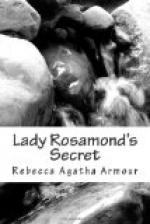The band afterwards played “Hail Columbia,” which was the signal for Captain Hawkins to respond. The American thanked the Commander and Officers of H. M. 52nd Regt. for the marked hospitality and courtesy extended to him during his stay. Alluding to the feeling of dissatisfaction existing between the sister nations, he hoped to see a firmer footing established between them; and all former animosities wiped out forever. These and other like sentiments called forth loud applause, the band playing “The Star Spangled Banner.” Speech followed toast and song until the hours wore on unheeded. Lest it might be considered an absurdity, we will not say how many toasts were actually made—not in water, either, on this occasion. The strongest proof of this fact was found in the dozens of empty bottles lying scattered in profusion upon sideboards, tables and floors, the following morning, as servants looked on in dismay. The task of removal is no slight task. Before the company breaks up let us take another glance at Lieutenant Trevelyan. In respect to his superiors the young gentleman still remained as one of the company. Though twenty-one years had lightly passed over our young friend and favourite, one would not judge that he was more than eighteen. His smooth and beardless face had the delicate bloom of a young and pretty girl. Dimples nestled in his cheeks playing hide and seek to the various emotions of the owner. Guy Trevelyan had not mastered his feelings during the “hurly burly,” as firmly as was his wont. Relapsing into an existence half reality, half dreamlike, he was striving to divine the true state of his thoughts when called upon by Sir Thomas Tilden. “Here is Lieutenant Trevelyan, the Adonis of our Regiment, whom we cannot accuse of a breach of impropriety to-night, except it be that of reserve.” “Come now, Trevelyan, you are in for a song,” exclaimed a dozen voices, pressing around the young Lieutenant, in noisy appeals. Contrary to their expectations, Trevelyan did favor the company with a patriotic song, which drew forth stirring applause and made him the hero of the evening. “Well done, my hearty,” exclaimed Captain Hawley, slapping him on the shoulders, shouting lustily, “Hurrah for Trevelyan, hip, hip, hurrah for Trevelyan.” “Eh, old chum,” muttered Lieutenant Landon, in incoherent and rambling speech, about “faint heart and fair lady.” “As congratulations are at present the rule, I cannot make an exception,” said Mr. Howe. “Thanks my boy for this, and may you soon have occasion for another.” “And another,” roared the crowd, taking up the last words of the secretary. “My warmest thanks, Mr. Trevelyan,” said the Lieutenant Colonel, warmly pressing his young friend’s hand. This last act of courtesy was more gratefully received by Mr. Trevelyan than the noisy demonstrations of his brother officers. Soon afterwards, guest after guest departed in various moods and in various ways; some making zig-zag and circuitous routes, while




